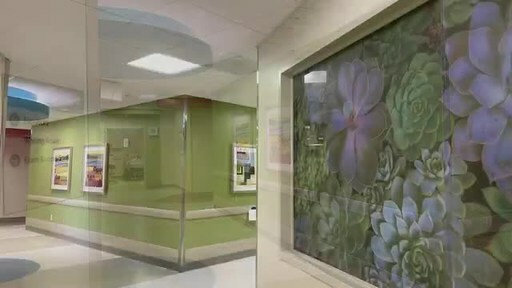A new and expanded neurodiagnostic laboratory will soon open at Phoenix Children’s to improve comfort and care for children undergoing sleep studies, electroencephalogram (EEG) and electromyography (EMG) testing and nerve conduction studies. One of many expansion projects underway at Phoenix Children’s Hospital – Thomas Campus, the neurodiagnostic laboratory is part of Barrow Neurological Institute at Phoenix Children’s and boasts 6,900 square feet, including eight patient rooms, a family lounge and designated work areas for clinicians.
“Patient comfort is always a priority for Phoenix Children’s, but it takes on much greater significance when it comes to testing that can feel stressful for children,” said Angus Wilfong, MD, division chief of neurology, interim division chief of developmental pediatrics and associate director of BNI at Phoenix Children’s. “This is especially true of sleep studies, which are critical for diagnosing a sleep disorder, but are often hard to perform because kids have trouble sleeping well in a hospital room. The rooms in our new sleep lab were designed to foster relaxation and sleep, which will ultimately improve our ability to diagnose and care for the children we serve.”
When drawing up the plans for the new and larger neurodiagnostic sleep and EEG laboratory, which opens April 27, the health system sought input from members of Phoenix Children’s Patient Family Advisory Councils (PFAC) about the features and amenities that would provide a tranquil, comfortable environment for children. Every aspect of the lab reflects feedback from families, from the color palette and lighting to furniture and features that bring a home-like environment to every patient room.
“I love that Phoenix Children’s honors the parent perspective, so I was excited when they asked me for input about the new sleep lab,” said Brittany Miller, chair of Phoenix Children’s neurology PFAC and mom to 13-year-old Brooke, who has complex medical needs and has required specialized care throughout her life. “Phoenix Children’s took parents’ feedback to heart and created an environment that’s peaceful, comfortable and feels much more like home. I know this will make the all the difference for kids and families, including my own.”
The neurodiagnostic laboratory is led by Randa Jarrar, MD, pediatric epileptologist and medical director of clinical neurophysiology and Rupali Drewek, MD, pediatric pulmonologist and sleep medicine specialist and medical director of the Sleep Disorders Program at Phoenix Children’s. Pediatric patients of all ages undergo EEG testing and sleep studies, from children who have chronic and complex medical conditions to otherwise healthy kids who are experiencing unexpected spells concerning for seizures, sleep disruptions or other symptoms that warrant a closer look.
During the day, the laboratory will serve children in need of neurodiagnostic testing (including EEGs and EMGs). These tests can be stressful for children but are essential in the evaluation of children with epilepsy, suspected seizures, muscle and nerve diseases and nerve injuries. At night, the sleep laboratory will focus on overnight testing and diagnostics for children who may have sleep disorders, including sleep apnea, narcolepsy or pediatric limb movement disorder. Sleep studies can also help providers determine whether patients can safely be weaned off certain equipment such as continuous positive airway pressure (CPAP).
Among the features of the new lab:
- Headboards, footboards and furniture make each patient room feel more like a child’s bedroom than a hospital room.
- Wired devices and other equipment are contained in cabinets to keep “scary” wires out of view.
- A new lighting system allows clinicians and parents to dim or turn up the lights without disrupting patients.
- Soundproof doors and walls block out noise from hallways and adjacent areas.
- In-room temperature control helps patient families maximize their comfort.
- Soft colors throughout the lab aid in relaxation.
- A family lounge area gives parents a place to unwind, take a phone call or enjoy a cup of coffee.
- Comfortable sleeper couches, which were tested by PFAC parents, help caregivers get a good night’s sleep, too.
- A room for bariatric patients has more space for a larger bed and additional equipment, ensuring a comfortable environment for children of all ages and sizes. Children who are obese tend to have thicker tissue around the throat, making them more prone to sleep apnea.
- Designated clinician spaces ensure plenty of room for providers and technologists to conduct and monitor testing.
In addition to the eight-bed neurodiagnostic laboratory at Phoenix Children’s Hospital – Thomas Campus, the health system will offer two beds at Phoenix Children’s Hospital – East Valley Campus, opening later this year, and four beds at Phoenix Children’s Hospital – Arrowhead Campus, opening in 2024. Phoenix Children’s is the only children’s hospital in Arizona with a level 4 designation by the National Association of Epilepsy Centers, signifying the highest-level medical and surgical evaluation and treatment for those with complex epilepsy. The Epilepsy Program is further accredited by the Laboratory Accreditation Board of the American Board of Registered EEG Technologists (ABRET) for its excellence in conducting and interpreting EEG tests. The health system is also home to Arizona’s only American Academy of Sleep Medicine accredited pediatric facility – and one of just a few accredited facilities in the Southwest.
